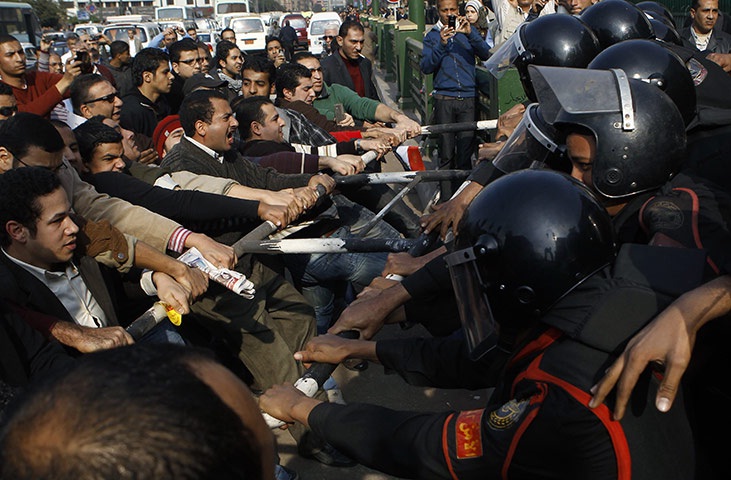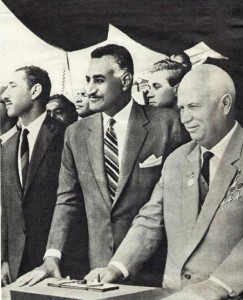North African Dispatches KEFAYA!
New in Ceasefire, North African Dispatches, Politics - Posted on Wednesday, January 26, 2011 11:22 - 1 Comment
Theories of a domino effect following the Tunisian revolution might just be proven accurate. As I write this week’s article, tens of thousands throughout Egypt march to demand the departure of Hosni Mubarak. Inspired by the Jasmine Revolution in Tunisia, their mobilization in a single day, illustrates the extent of the exasperation with the country’s authoritarian thirty year regime. Theirs, much like their neighbors’, are the sentiments of a youth left to wander the streets of their countries without a future. They demand dignity, political liberties and aspire to achievements thus far kept out of their reach. They daydream of a better, more just, life abroad and who could blame them? What exactly will become of the Mubarak regime in the days to follow is still very unclear, however, as I stated in my previous contribution, the proliferation of these protests are considerable signs of a new era in this part of the globe.
In this respect I thought I would re-explore a classic novel by George Orwell, which in my opinion, does far greater than any analysis I could ever muster to explain what exactly is occurring in our region and how we got here. The novel in question is none other than ‘Animal Farm’. In this 1945 classic, Orwell tells the tale of a group of farm animals inspired to undertake a revolution to depose their power-drunk human master, farmer Jones. The characters in this story, their trajectory and their purpose are what make the story a must-read for anyone hoping to decipher post-revolutionary authoritarian regimes. Though I’m willing to concede that certain details distinguish one country from another, the fact of the matter remains that this allegorical novel sets an accurate model for how these governments operate. It is helpful in explaining the fall of the Tunisian tyrant, Ben Ali, and may help to decipher what lies ahead for Morocco, Algeria, Egypt and Yemen (to name but a few).
The story begins when Old Major, the farm’s dying boar calls on the other animals to revolt against their tyrannical master. His is a discourse inspired by a long life which enabled him to witness the injustices committed towards domesticated animals, unable to reap any reward for their efforts. Old Major is an interesting comparison of the anti-colonial values and the well-intentioned movements (or leaders) that inspire most states towards seeking independence. His final words would inspire two young and determined pigs, Napoleon and Snowball, to lead the animals’ successful revolution. The latter’s achievements resided not only in the fleeing of Farmer Jones but also of the establishment of a new value-system, Animalism, materialized in seven commandments. This new philosophy primarily enshrined equality as the most important of all values but also introduced the rejection of all things human (i.e. reminiscent of their past oppressors: “four legs good, two legs bad”).Though this caricature was initially aimed at critically illustrating communism’s supremacy in the USSR, it can also be applied to the ascendancy of pan-Arab, martial-socialism in the Maghreb throughout the 60’s and 70’s.
Essentially, the book aims at describing the extent to which the revolution’s values are betrayed by the new ruling elite, in the form of the farms’ pigs. Despite his efforts in the animals’ liberation and education, the benevolent Snowball becomes in the eyes of Napoleon, a dangerous competitor. Napoleon has his former partner chased off the farm and establishes a new partnership with Squealer whose task is to manage propaganda. Napoleon slowly installs an autocracy enforced via the farm’s fierce dogs he himself raised to solely obey his orders. Through them he is able to scare those that might be tempted to oppose his exclusive rule. Again, the analogies with the Maghreb are striking. One could easily draw the correlation between Napoleon and the regimes in North Africa and how they have used force rather than dialogue or consensus to implement their vision of things. Furthermore, in revolutionary Libya, Algeria or Egypt, activists that had shepherded the national liberation movements and who disagreed with the direction things were taking were –much like Snowball- assassinated, exiled or left on the sidelines of what was their right to contribute to their country’s political life. Finally, governments often base their power in-as was the case with Squealer- the unsubtle use of an official narrative in all areas of public life to maintain a fear of reprisals. This keeps their population, primarily concerned with their survival, acquiescent.
What I believe to be essential in Orwell’s novel is its account of how Napoleon’s rule signifies an unnoticed return to human-type subjugation and terror for the rest of the farm animals. An example of this is how the once fair and just commandments are changed to say how some animals are MORE equal than others. Moreover, the ruling class’ widespread moral and material corruption comes to define Napoleon’s rule. The pigs begin to walk, dress, drink in excess and live in the same house as did their previous master. Their comforts evidently begin to exceed their subjects’. The populace, which Orwell represents through Animal Farm’s submissive sheep and the work-horse Boxer are kept from understanding their own changing realities and merely encouraged to work harder and leave the governing to the elite. They are also told the farm, understand an allegory for country, is more prosperous; that progress is being made while the farm’s leaders are slowly turning into that which oppressed them previously. I believe it to be the case that the protests in North Africa are the result of a similar evolution of things. Previously unjust rulers have merely been replaced by new ones and people have come to realize this. In Egypt, the opposition’s slogan KEFAYA or ENOUGH in English sums up an informed youth’s willingness to rid themselves of these seemingly unmovable regimes. Sadly, their demands for reform and democratic overtures are persistently met with repression and condescendence which will inevitably result in loss of life.
Kateb Salim writes weekly on African and Maghreb affairs for Ceasefire. His interests include politics, current affairs and Real Madrid FC.
1 Comment
nadia




The analogy made between the story of animal farm and the situation in many arab countries is very accurate;
what is happening now in those countries reflect a rejection of the rules imposed for decades,the rejection of injustice and inequalities.
populations particularly young people want to see a real changes and are not ready to accept what their parents accepted for decades.
I wish that rulers in arab world take this historic opportunity to make profound refoms to save their countries not regimes and avoid all those lost of lives;
congratulations for a meaningful and intersting analysis.